Reviewed by Glenn Erickson
Foreign film directors that come to the states to make movies with American themes, often see things more clearly than Hollywood does. Jean Renoir's Swamp Water, for instance, tells a tale of rural Georgia with great feeling. Other directors had less success. Zabriskie Point convinced few critics that Michelangelo Antonioni's 'vision' of The Revolution was anything more than a leftist fantasy. This makes Alan Parker's 1988 Mississippi Burning all the more difficult to understand. Parker's direction is good and his actors better than good. But even though the film takes an aggressive pro- Civil Rights position, its tale of Federal agents versus Southern rednecks couldn't be more misdirected.
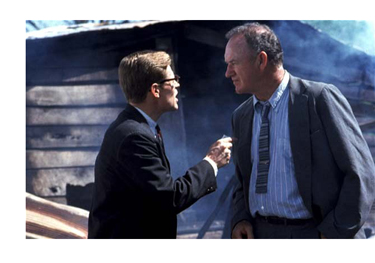
FBI Agents Rupert Anderson and Alan Ward (Gene Hackman and Willem Dafoe) arrive in Jessup County Mississippi to find out what happened to three young Civil Rights activists (two white, one black) who disappeared without a trace. They get nowhere. The whites are mostly hostile and the blacks won't cooperate, as they receive beatings just for being approached by Anderson and Ward. The agents disagree on policy. Anderson has an affair with the wife (Frances McDormand) of a local deputy, Pell (Brad Dourif). They eventually find the bodies. When the Klan strikes back with more violence, the F.B.I. goes into all-out war mode.
Compared to Mississippi Burning, Stanley Kramer's transparently pro- Civil Rights films The Defiant Ones and Guess Who's Coming to Dinner? are masterpieces of good judgment and restraint. Englishman Alan Parker mastered flashy musicals and got attention as a witty stylist with the rich atmosphere and show-off visuals in things like Midnight Express, Fame and Angel Heart. Mississippi Burning reduces the Civil Rights struggle to something around which a crowd-pleasing thriller can be built.
'Socially conscious' movies about America's nagging race problem have fared worse than most. Hollywood switched anti-Semitism for race prejudice as the subject of Home of the Brave, resulting in a sincere but somewhat confusing movie. 'True, hard hitting' stories about race prejudice somehow still felt compelled to cast non-black actors in black roles (Pinky, Lost Boundaries). Yet almost forty years later, Mississippi Burning sorely lacks the sensitivity of those pictures, which at least were committed to human values. Alan Parker approaches Civil Rights in the '60s as if it he had just discovered it, and was all excited to let us know what kinds of shocking injustices occurred.
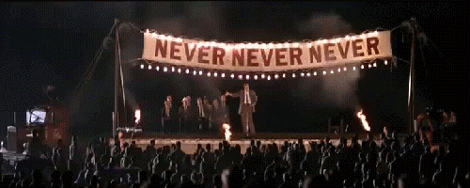
Just what's so offensive about Mississippi Burning? I'll try to make this short. First, it trivializes the Civil Rights Movement by having no major black roles. It's about good white people dealing with bad white people. The Mississippi blacks are shunted away in sidebar scenes showing brutality, or scenes where they're singing gospel hymns, that conveniently provide a soulful underscore. Those hymns juxtapose nicely with shots of burning churches.
The F.B.I. presented here is a fantasy. J. Edgar Hoover was doing everything he could to put Martin Luther King out of business and would much rather have the 'problem' of anti-segregation battles just go away. Agents were dispatched because Washington could no longer ignore the publicity about the lawlessness in the South. The philosophical conflict between Anderson and Ward is a crock. They're both agents and would be doing things by the book.
The portrait of Mississippians is so one-sided that it's no surprise that the South considers Hollywood its mortal enemy. Mississippi seems almost exclusively populated by racist monsters and inbred, mouth-breathing goons. Just the same, the brutal redneck antics are the engine that makes the movie exciting. Gene Hackman looks good trading threats with great actors like Brad Dourif, Gailard Sartain and Michael Rooker. All are morally and humanly despicable, especially Stephen Tobolowski's evil KKK leader, who is so goofy that he'd be a perfect fit for the comedy Klan rally in O, Brother Where Art Thou? I understand that types such as these are not rare, but framing the confrontation so baldly sells the notion that these people are not like us. They are monsters, and we have nothing to do with them; all those 'bad things' exist only in godforsaken places like Mississippi.Mississippi Burning makes it easy for viewers to feel good about the race issue.
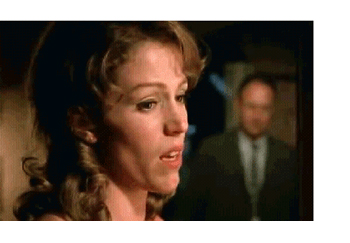
Parker is incapable of subtlety. Characters tend to speak in bursts of exposition. At one point Hackman and Dafoe carry on a six-sentence argument that jumps between three separate subjects -- it's just random declarative statements. Characters are also given lame, on the nose dialogue. Mrs. Pell is shown playing with a black baby, and we wonder why her racist neighbors aren't rushing out to stage an intervention. Brad Dourif's husband just says, "Funny, their kids are so cute." Ah, the irony. F.B.I. agent Willem Dafoe rescues a black man, holds him in his arms and exclaims, "What's wrong with these people?" The scene looks like a bad pose for a bad propaganda poster.
The dialogue averages one nugget of wisdom per conversation. Mrs. Pell's "Hatred isn't something you're born with" speech sounds like a paraphrase of the "You've Got to Be Taught" song from South Pacific. Some lines are just plain stupid setups for righteous retorts: Anderson: "If I were a Negro, I'd probably think the same way they do." Ward: "If you were a Negro, nobody would give a damn what you thought." Dafoe delivers what may be the most cliché- laden Bad Liberal Movie speech of all time: "Anyone's guilty who lets these things happen and pretends like it isn't. No, he was guilty all right. Just as guilty as the fanatics who pulled the trigger. Maybe we all are." Be sure to take notes.
As in most of his movies, Parker chooses to make everything look pretty. Burning churches are filmed for maximum beauty. A lynching is shot in silhouette in front of a burning house. I swear, even the carcasses of dead cows and horses are arranged to look like artwork. The people are attractive. All the black characters look dignified; none are civic embarrassments showing the debasing effects of poverty and ignorance. The violence is decorative. A house is dynamited in gorgeous slow motion. As the camera pulls back, a sign in the yard blows up too. Those murderous Klansmen have put a stick of dynamite in the mailbox as well, just to make the shot look cool in slo-mo.

At this point we realize that Mississippi Burning is little more than a commercial concoction, a feel-good movie. Hackman's Anderson carries on a love affair with the Deputy's wife, Mrs. Pell. She claims that there are nice people in town, but we see zero evidence of that. Hackman uses her to obtain vital information, and she's treated as if she collaborated with an occupying army. I'm going to stay here, she tells us, because people like the way I do their hair. Off the 'relationship hook,' Hackman gives her a wink as he exits, without even a 'wham, bam, thank you ma'am.'
The movie isn't even anti-violence, quite the contrary. After a few mealy-mouthed lines about procedure, the F.B.I. agents solve the case by tricking information out of people. Anderson's sweet-talks Mrs. Pell into spilling the biggest can of beans. He course doesn't think to protect her, and when the rednecks put her in the hospital, it all gets personal. Note that the Feds go radical only after a white woman is attacked. They out-and-out kidnap and terrorize the Mayor (R. Lee Ermey) and knock heads together when they start making arrests. Hackman is suddenly Popeye Doyle again, complete with new snappy insults for us to cheer. It's major payback time, reverse vigilantism to create an upbeat kick-ass ending that sends all the wrong messages.
It's as simplistic and immoral as the westerns of the late 1950s, that were really an excuse to see Marshall Dillon gun down bad guys in the name of
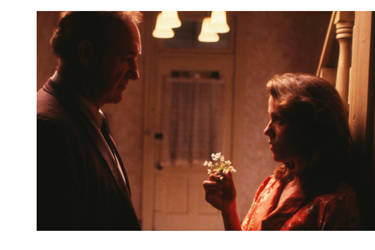 Law and Order. That's basically what Gene Hackman does here. His Anderson offers to shoot it out with deputy Pell and then drops in on the deputy's wife. It makes the movie, not to mention the whole country, seem ridiculously hypocritical. A black FBI agent is flown in by Anderson just for a day to threaten a hostage with castration, just to give the audience the thrill of seeing a redneck confronted with his worst fears. Mississippi Burning is about cheap revenge, not justice.
Law and Order. That's basically what Gene Hackman does here. His Anderson offers to shoot it out with deputy Pell and then drops in on the deputy's wife. It makes the movie, not to mention the whole country, seem ridiculously hypocritical. A black FBI agent is flown in by Anderson just for a day to threaten a hostage with castration, just to give the audience the thrill of seeing a redneck confronted with his worst fears. Mississippi Burning is about cheap revenge, not justice.
Little things like the script, the approach and the visuals aside, Alan Parker handles his cast quite well. The entertaining movie has good acting from all concerned. Hackman updates his Buck Barrow good old boy persona to charming effect, whether flirting with a waitress or trading snarls with Michael Rooker. Willem Dafoe gets to play an earnest humanitarian, a sensitive soul bending rules to defend the defenseless. Dafoe gives it his best despite the fact that Ward's activist attitude just doesn't fit in -- this guy would be a volunteer for Martin Luther King, not working for J. Edgar Hoover. A colorless F.B.I. associate does all the real work. Like a straight man, he asks the questions so Ward can come back with snappy, right-thinking answers.
Brad Dourif, R. Lee Ermey, Stephen Tobolowsky and Michael Rooker are nicely distinguished as the bad guys, with Pruitt Taylor Vince (Shy People) especially good as the weak link exploitable by the boys from Washington. And the movie is always worth seeing for Frances McDormand's performance. Her character is too sane and intelligent to fit in with the general barbarity, however.
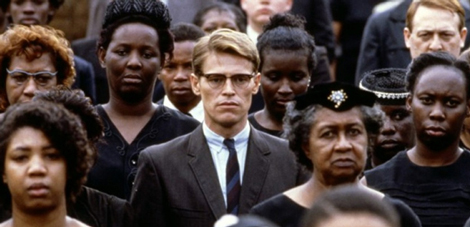
The Twilight Time Blu-ray of Mississippi Burning is really nice-looking. Peter Biziou's gorgeous photography shows off the Mississippi countryside. The production had no difficulty shooting in Mississippi and Alabama, states that actively court the income that film productions bring. Back in the 1960s, when these historical events were happening, Roger Corman went South to film a really courageous and daring anti-segregation film. Things were so dicey that his company found it necessary to hide the nature of what was being filmed.
The extras include an Isolated Score Track for Trevor Jones' music, an audio commentary with director Alan Parker, plus an original trailer. I know that trailer well, as it was on every Orion promo reel until the company shut down.1
Julie Kirgo's liner notes make a strong case for the film's better aspects, but also acknowledges the dishonest, crowd pleasing violence of the last act. In any case, this is yet another beautifully-rendered Blu-ray from Twilight Time.

On a scale of Excellent, Good, Fair, and Poor,
Mississippi Burning Blu-ray rates:
Movie: Fair but entertaining in spite of it
Video: Excellent
Sound: Excellent
Supplements: Isolated Score Track, director commentary, trailer, Julie Kirgo liner notes
Deaf and Hearing Impaired Friendly?
YES; Subtitles: English
Packaging: Keep case
Reviewed: June 7, 2015
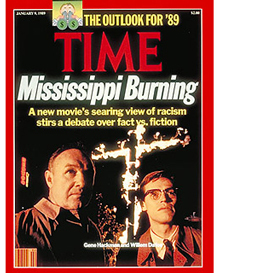
Footnote:
1. We worked with that trailer a lot at the trailer company Film Impressions, long before I saw the whole movie. It uses that shot of the mailbox blowing up; the editors had a big discussion about how that one shot symbolized Bad Socially Conscious moviemaking. It takes enormous intelligence and judgment to make a movie about a subject as loaded as the Civil Rights Movement. Even Time magazine picked up on the film's misrepresentations. To fully understand one has to be familiar with documents like The Murder of Fred Hampton, that argue that the Bureau was really fighting on the other side of the issue.
Return

Text © Copyright 2015 Glenn Erickson
See more exclusive reviews on the Savant Main Page.
Reviews on the Savant main site have additional credits information and are often updated and annotated with reader input and graphics.
T'was Ever Thus.
Return to Top of Page
|


